Key considerations
- Available for £160,000
- 4.0-litre 510hp naturally aspirated flat-six, rear-wheel drive
- Fabulous drivetrain and chassis
- PDK will do 2-second 0-62s
- Touring version is less showy but hardly less gifted
- Values might soon start to rise at a faster rate
When the seventh edition of Porsche’s 911 GT3 was revealed in February 2021, testers wondered how the newcomer could possibly be any better than its predecessor, just as they had wondered about every previous iteration of this vehicle.
And just as they had done before, Porsche went ahead and made it better. That’s pretty much been the story of the GT3. If you subscribe to that idea you might well come to the conclusion that the current GT3, the 992 version, is the best GT3. And that really is saying something.
Power for the 992 GT3 came from the genuinely epic 4.0 litre naturally aspirated flat-six. The car could be had in either winged or wingless (Touring) formats, and with either a 7-speed PDK twin-clutch auto or a six-speed manual. The body was based on the 911 Carrera’s but with a 48mm wider front track to accommodate a new (for the production 911) double-wishbone front axle adapted from racing 911s.
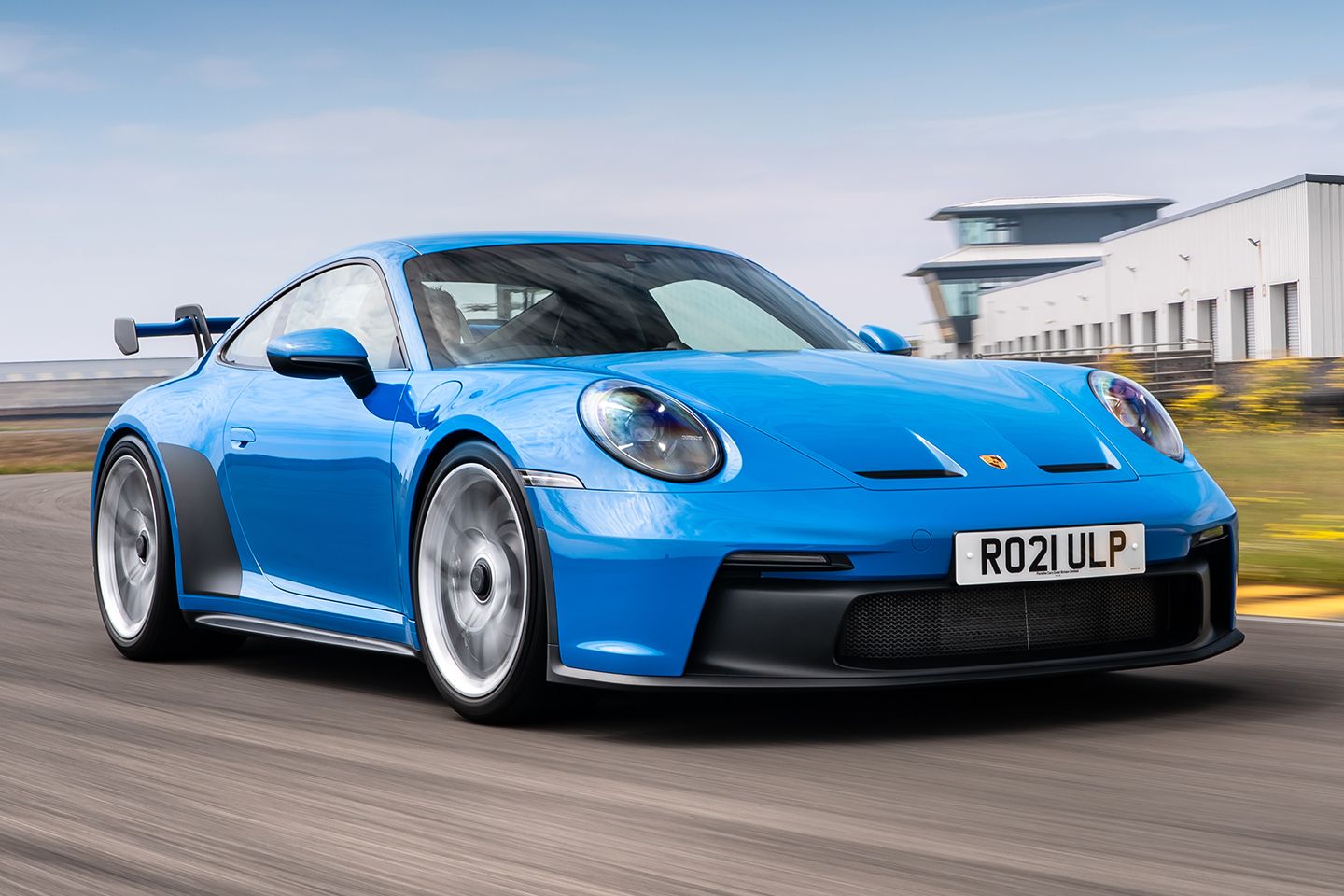
Looking at the 992 range overall, the new 911s were heavier than their 991 antecedents but Porsche managed to keep the weight gap between the new and old GT3s to an impressive 5kg in PDK spec by using more lightweight materials. The bonnet, fixed rear spoiler under the rear wing, and the rear wing itself (with ‘swan neck’ over-the-top supports for better airflow) were all made of carbon fibre reinforced polymer. Porsche reckoned that the GT3 was the world’s first mass-produced (sort of) car in the world to have a CFRP bonnet, or frunk if you can bear the word. That saved 2.5kg. Plastic wasn’t used for the new GT3’s windows but the glass was lightweight and noise-insulated, resulting in a saving of 5kg on regular glass.
By working the options list you could create a road-biased car, a track day special, or anything in between, with absolute reassurance that it would excel at any level. Never before had GT3 buyers had such flexibility of choice. The Club Sport Package with a half-cage was a free option, but it wasn’t really because you had to have the carbon bucket seats with it and they cost £3,800.
Technically, prices for the 992 GT3 started at £128,000 for the Touring and £146,000 for the winged car. Those prices included a familiarisation day at the Porsche Experience Centre at Silverstone. Against cars like the £165k Lamborghini Huracan or the near £300k McLaren 765 LT the GT3s looked like stone-cold bargains. Of course the GT3 RRPs were notional for all but those who had worked themselves into Porsche’s good books by being serial buyers, not just of 911s generally but of GT3s in particular, the expectation being that their old GT3 would be traded in for the new one. It’s doubtful that any actual base-spec GT3s were ever sold. At the time of writing in May 2024 there were around 50 992 GT3s on the used market, at prices starting from just below £160,000. Only two of those fifty had done more than 10,000 miles.
SPECIFICATION | PORSCHE 911 GT3 (992, 2021-on)
Engine: 3,996cc flat-six
Transmission: 6-speed manual or 7-speed PDK auto, rear-wheel drive
Power (hp): 510@8,400rpm
Torque (lb ft): 347@6,100rpm
0-62mph (secs): 3.9 (3.4 PDK)
Top speed (mph): 199 (man), 198 (PDK)
Weight (kg): 1,418 (1,435 PDK)
MPG (official combined): 21.9
CO2 (g/km): 304
Wheels (in): 9.5 x 20 (f), 12 x 21 (r)
Tyres: 255/35 (f), 315/30 (r)
On sale: 2021 – on
Price new: £146,000
Price now: from £160,000
Note for reference: car weight and power data are hard to pin down with absolute certainty. For consistency, we use the same source for all our guides. We hope the data we use is right more often than it’s wrong. Our advice is to treat it as relative rather than definitive.
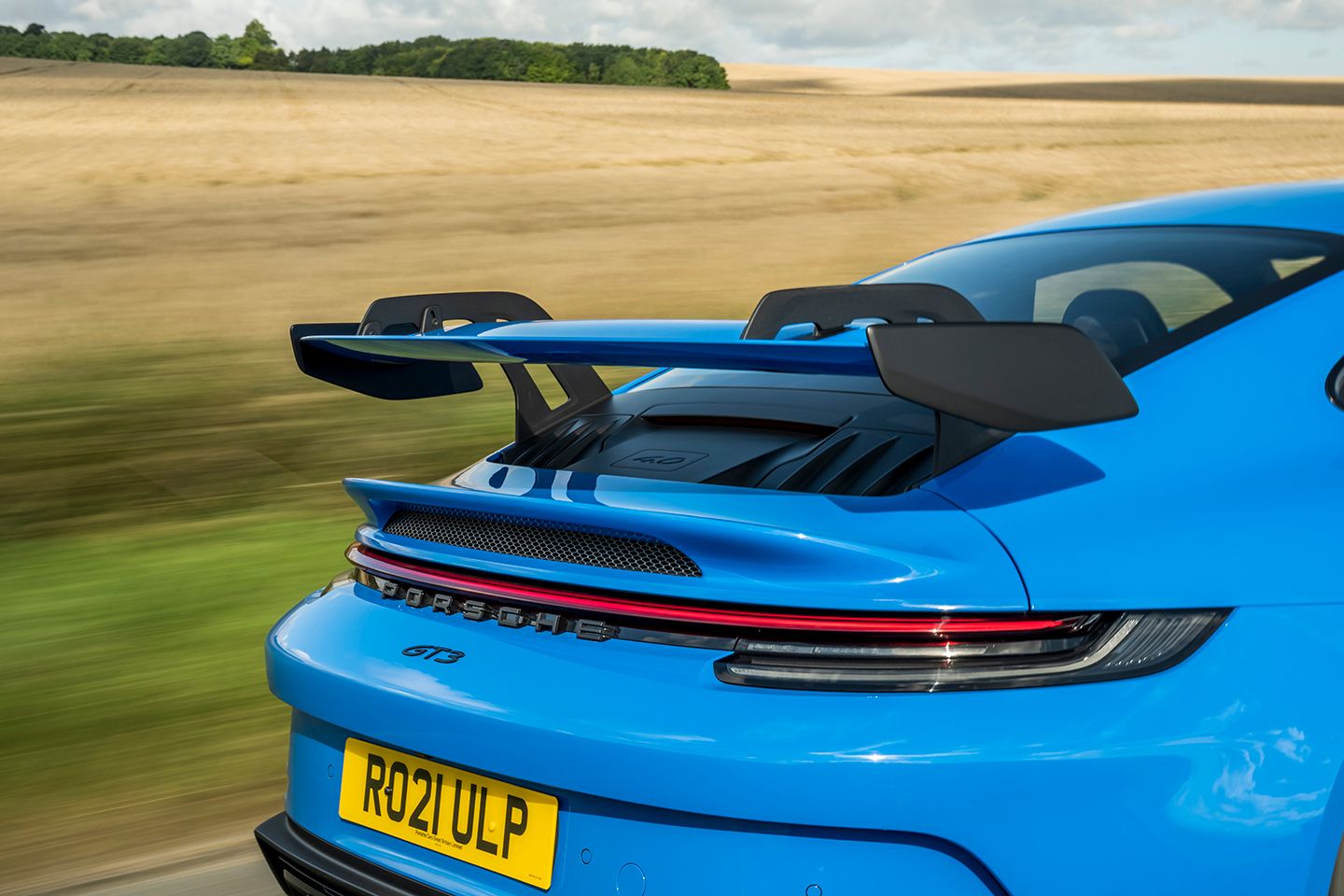
ENGINE & GEARBOX
The rise of turbocharged engines has made natural aspiration a rare thing on the motoring landscape. The GT3’s 4.0 litre six, first seen in the limited production 911 Speedster of 2019, was virtually the same as the 911 GT3 Cup race car’s. In the 992 GT3 it had new pistons and individual throttle bodies for razor-sharp responses. Lubrication was dry-sump with seven suction stages to ensure that nothing ran dry in the most testing of scenarios. Legislation demanded the presence of particulate filters in the exhaust but as compensation the 992’s silencer was 10kg lighter than the 991 GT3’s. A new lightweight battery saved 10kg.
Theoretically, large displacement engines shouldn’t be rev monsters, but the GT3 demonstrated that if you threw enough engineering brilliance at something you could achieve miracles. The engine produced peak power at a dizzy 8,400rpm and would go on to 9,000rpm with no sensation of stress, just a life-affirming scream of fine metals meshing in perfect harmony.
The new GT3 was only about 10hp more powerful than its predecessor but you should never make the mistake of thinking that its 510hp and 347lb ft wasn’t enough in a modern sports car. It was more than enough to get your eyes popping, especially if you were prepared to explore the magical realm above 4,500rpm.
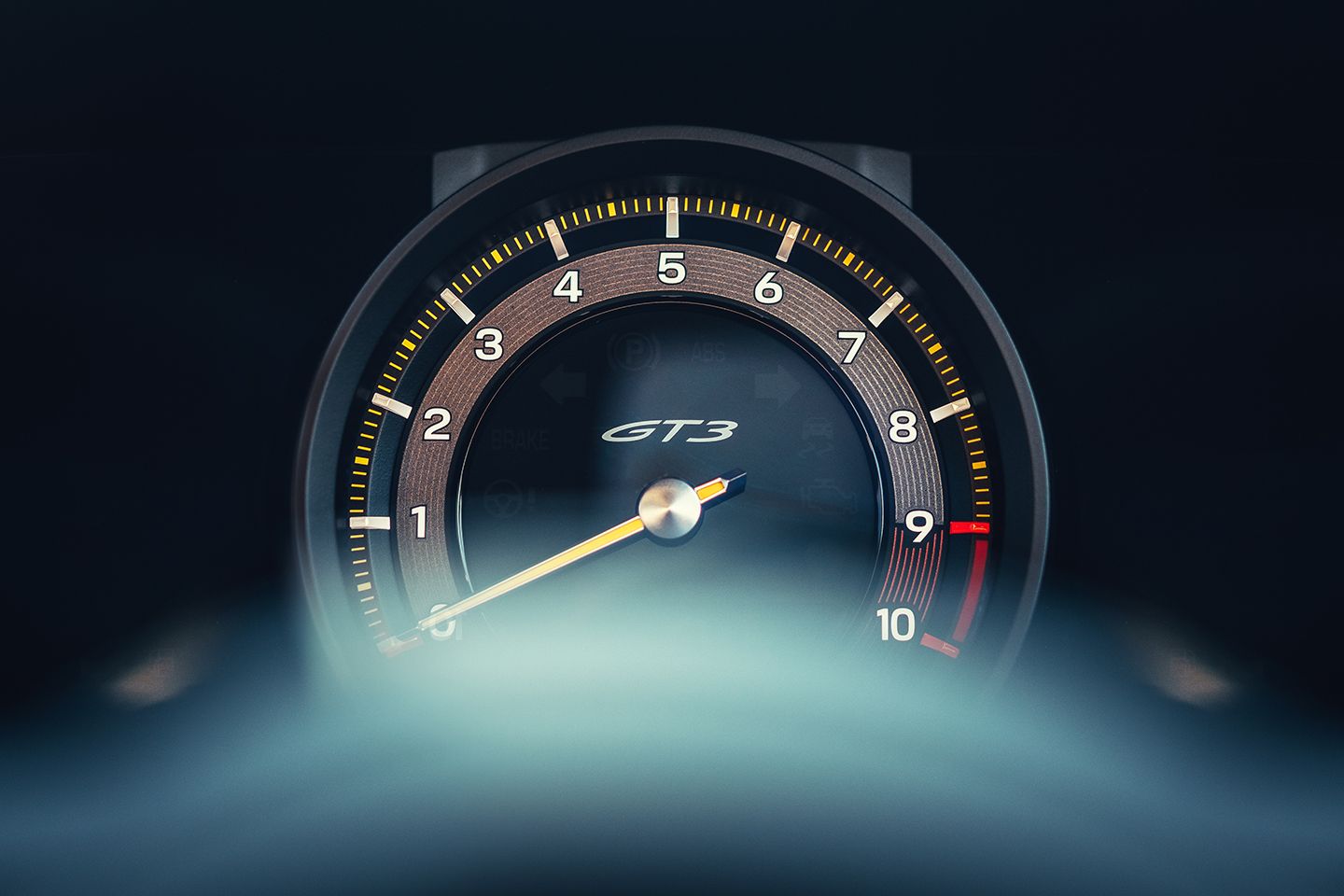
Unsurprisingly the PDK car was fantastic and very popular in the UK, with four out of five buyers opting for that gearbox. The manual version was arguably more engaging to drive and it was 1mph faster at the top end, but emissions regs made the gearing quite long. You could keep both hands on the wheel of a PDK car and it did give you an easier time in traffic. It was a lot quicker too, officially half a second better than the manual over the 0-62mph run.
In fact, the difference was greater than that because these claimed 0-62mph times for the PDK were pessimistic. It didn’t take much in the way of skill to record sub-3sec times. In the 992 GT3 the PDK – an ‘old‘ 7-speeder to save weight – was operated by a lever rather than the toggle found elsewhere in the 992 range, where cars like the Carrera and Turbo ran newer (but also heavier) 8-speed PDKs and 7-speed manuals.
The GT3’s official fuel consumption figures of just under 22mpg for both manual and PDK were achieveable on the road but you’d be doing well to get better than mid-20s even on gentler motorway runs and low teens were entirely normal when you were having fun. That was the price you paid for going down the relatively inefficient non-turbo route. We’re not aware of any serious underlying issues with the powertrain but oil filler assemblies were recalled for replacement after some failed where the cap attached to the neck of the pipe.
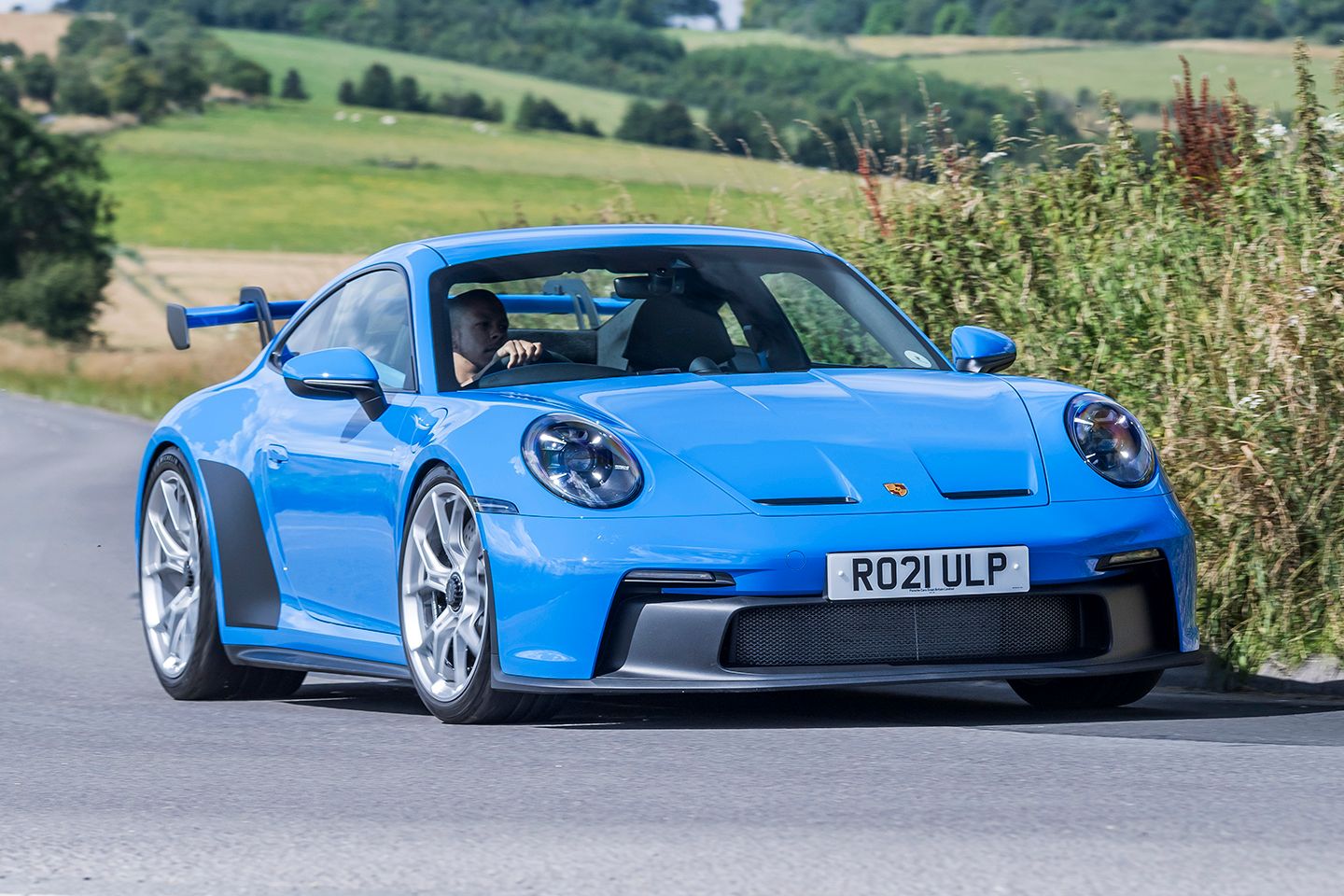
CHASSIS
There was no commonality between the suspension of the 911 Carrera and that of the GT3. The GT3’s new double-wishbone front axle – a first for a roadgoing 911 – was adapted from the one used on the 911 RSR racer. The rear axle was multilink as usual but more rose joints were used at both ends. Combined with a 20mm lower ride height than the regular Carrera 2S and spring rates that were twice as stiff as the C2S’s it all added up to extra precision and directness in the steering and extra stability in high-speed cornering through the increase of camber stiffness and the maintenance of consistency in the tyre contact patches. GT3-bespoke adaptive dampers were fitted to make the ride liveable.
Instead of the Normal, Sport, and Sport Plus modes you got Normal, Sport and Track which also gave you a new Track Screen function that we’ll talk about later. Traction control was either on or off, but camber, toe angle and the stiffness of the anti-roll bar were all adjustable. To finish everything off there was rear-wheel steering and a limited-slip differential.
It was quite a package, and boy did it work. Driving a 992 GT3 was a thrilling but also somehow miraculously benign experience. The levels of grip, turn-in and load feedback were off the scale. It took major commitment to unstick the back end and there was no punishment for tapping off to quell the controlled slide, especially with the more road-focused Pirellis which could exhibit mild understeer on cold roads.
Porsche assisted you in your remarkably easy elevation to driving god status by supplying braking power that could dig you out of practically any situation. The default cast iron system featured 408mm front discs, the same size as those used in the contemporary 911 Turbo. That made them 28mm larger than the previous generation GT3’s and 17 per cent lighter too as a result of a friction ring redesign. PCCB carbon ceramic brakes (410mm front, 390mm rear) cut the weight of the brake componentry in half, making it a commonly ticked GT3 box at £6,500 or a little over £7,000 if you wanted black calipers instead of the default yellow ones.

That £600 difference for a caliper colour change gave the £840 that Porsche charged for painting the wheels a bargainy look. The 992’s forged alloy centerlock wheels were 9.5 x 20 at the front, half an inch wider than the 991 GT3’s, and 12 x 21 at the rear, an inch wider than the 991’s. You could have pinstriping on them in either Shark Blue or Guards Red.
Pirelli P Zeros were the default tyre choice. You could option the Michelin Pilot Sport Cup 2 track-biased tyres that Porsche had used to set a lap time of 6min 59.9sec at the Nurburgring. That was 17 seconds quicker than the 991 GT3’s time.
The three most expensive GT3s on the UK used market at the time of writing were priced at £230,000-£235,000, or about £20k more than the next most expensive cars, and that was because they had Manthey Racing performance kits on them. The key items in these fully Porsche-approved kits were the four-way adjustable coilovers. You also got carbon aero rear wheel covers, rear wing and end plates plus a Manthey rear diffuser, front lip, canards, underfloor air guides and a few other cosmetic bits and bobs. It made a difference. Manthey-kitted GT3s went around the ‘ring in 6m 55.7sec, more than four seconds quicker than standard.
992 GT3 servicing can be surprisingly affordable if you go to an independent specialist. We’ve seen quotes of £185 for the oil and filter change and £425 for the major service at 20,000 miles. Porsche dealers will charge considerably more.
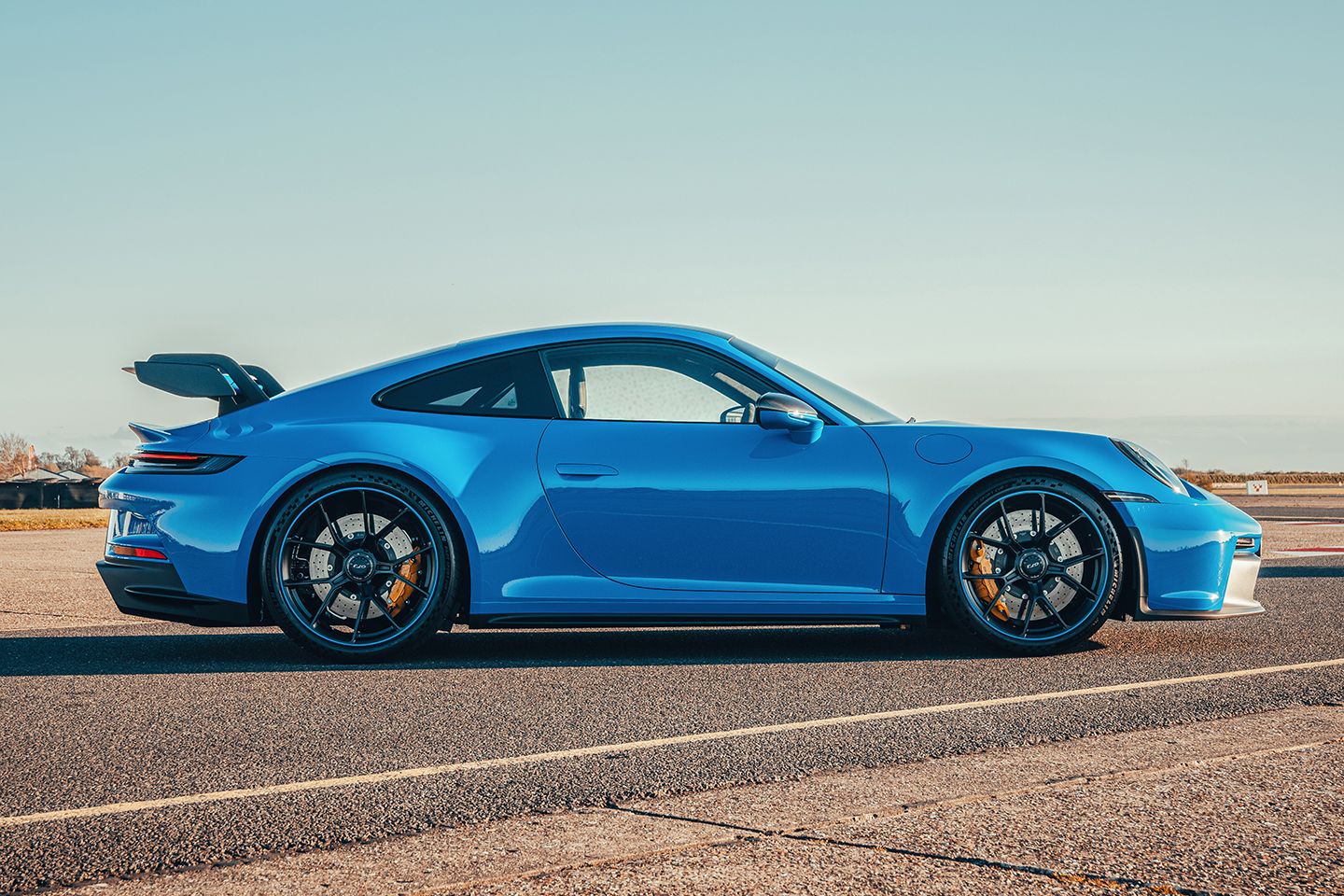
BODYWORK
Aero efficiency was central to the new GT3’s ability. The non-Touring model’s front spoiler and diffuser and the rear wing were all adjustable in stages for optimum performance on road or track. In its least extreme position the rear wing provided up to 50 per cent more aerodynamic downforce than the preceding 911 GT3. With both ends set at track positions, downforce increased by up to 150 per cent, to 385kg. The Touring had an automatically extending rear spoiler to deliver sufficient downforce for everyday autobahn-monstering. Silver anodised trim strips around the side windows, a ‘GT3 touring’ legend on the engine cover grille and a body-coloured front intake panel further distinguished the Touring from the winged car.
To lower the GT3’s centre of gravity you could have a carbon roof at just over £2,500, which seemed pretty reasonable against what some other manufacturers were asking for that. Porsche had a similarly businesslike approach to paint colours. Standard solids in black, white, Guards Red or Racing Yellow were free. Picking one of the five metallics would cost you less than £900. Four more ‘special’ metallics were available at just over £2,500, or you could go for a paint-to-sample ‘Exclusive’ colour at a price you had to talk to your Porsche Centre about. We saw a 100-mile Black Olive car for sale in May ’24 that looked really special. Shark Blue cars would knock your eyes out but the majority of cars sold in the UK were painted in more sober colours like grey or black.
Porsche thoughtfully kept carbon away from most of the areas of the car that were most likely to be hit by flying road debris. However, given the proximity of the front underbody to the ground, many buyers forked over £2,200 for the front axle lift.
A recall was issued in February 2024 for front screens and rear windows which could detach on ‘certain’ (not sure which) 911s built between 2020 and 2024. In June ’23 there was a recall for a software error in the rear spoiler control unit on some 2022-23 GT3 Tourings which could allow the two high-level brake lights to come on when the rear spoiler was manually deployed at speeds below 56mph. The 992’s popout doorhandles have been known to squeak. Some GT3s were delivered with scratched rear diffusers.
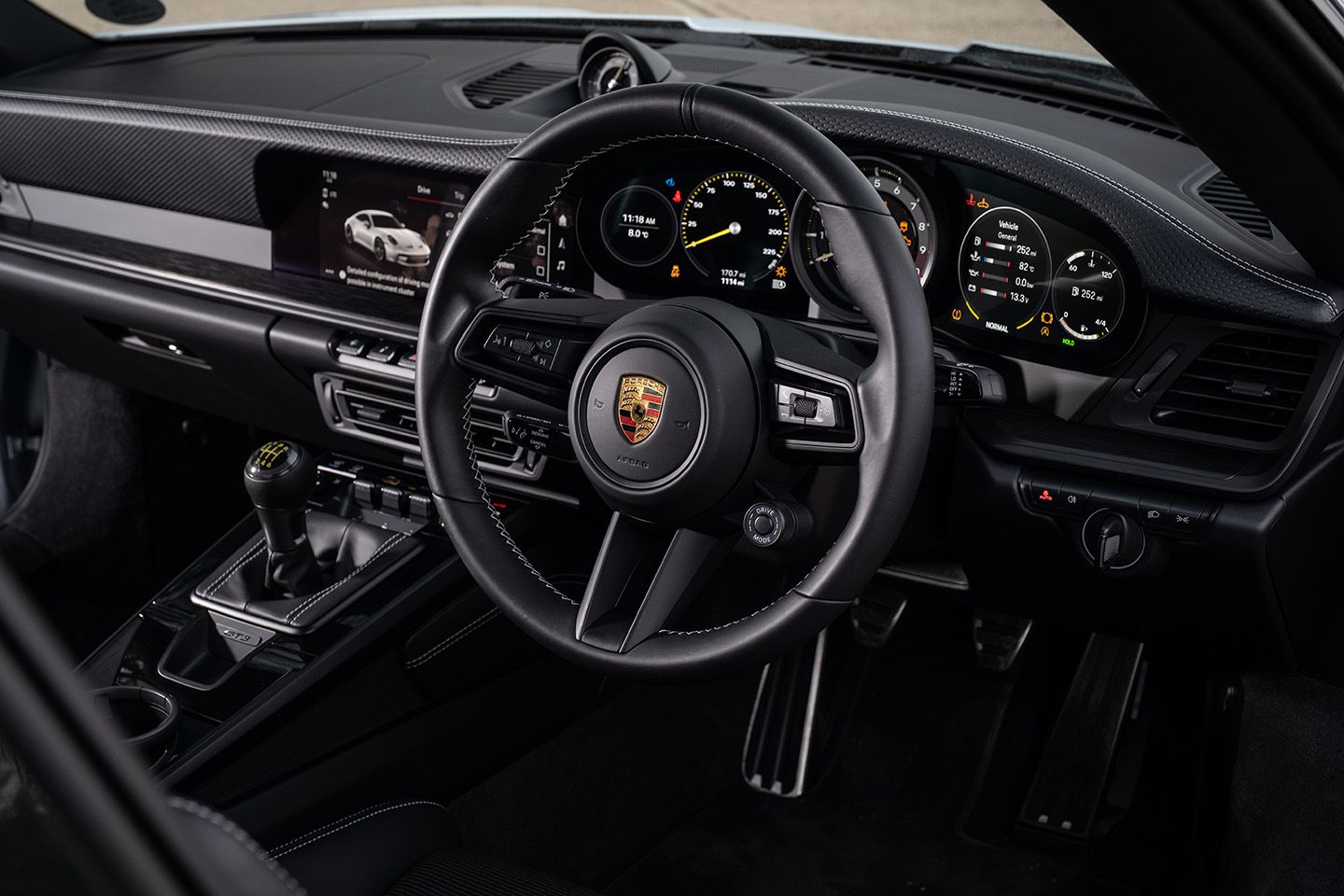
INTERIOR
The GT3’s interior had a nicely racy feel to it, especially on the winged cars which had Race-Tex upholstery. Extended leather was standard on (and exclusive to) Touring cars, but via Porsche’s ‘Exclusive’ atelier you could pick from a wide range of materials, including historic ones if that was your bent.
Rear seat delete was standard in the GT3. Standard seats were four-way electrically-adjustable Sport Seats Plus items but many buyers went for either the 18-way SSP chairs or the carbon fibre full buckets which chopped nearly 12kg off the car’s weight. In the Club Sport package the roll cage was joined by racing harnesses and a fire extinguisher.
For the first time in a GT3 the multifunction sport steering wheel had a drive mode switch. As mentioned earlier, instead of the toggle gear selection that other PDK-equipped gen-eight 911s had, the GT3 had an adapted version of the manual gearbox’s lever. That gave you the option of manual shifts without using the wheel paddles.
The new flatter dash incorporated two seven-inch digital displays and an analogue central tachometer. Bespoke to the GT3 was a Track Screen function which (a bit like Saab’s Night Vision) limited the amount of potentially distracting info to essentials and kept what was left close to the tachometer. Tyre pressures and water temp were located on the left of the tach, with configurable info available on the right.
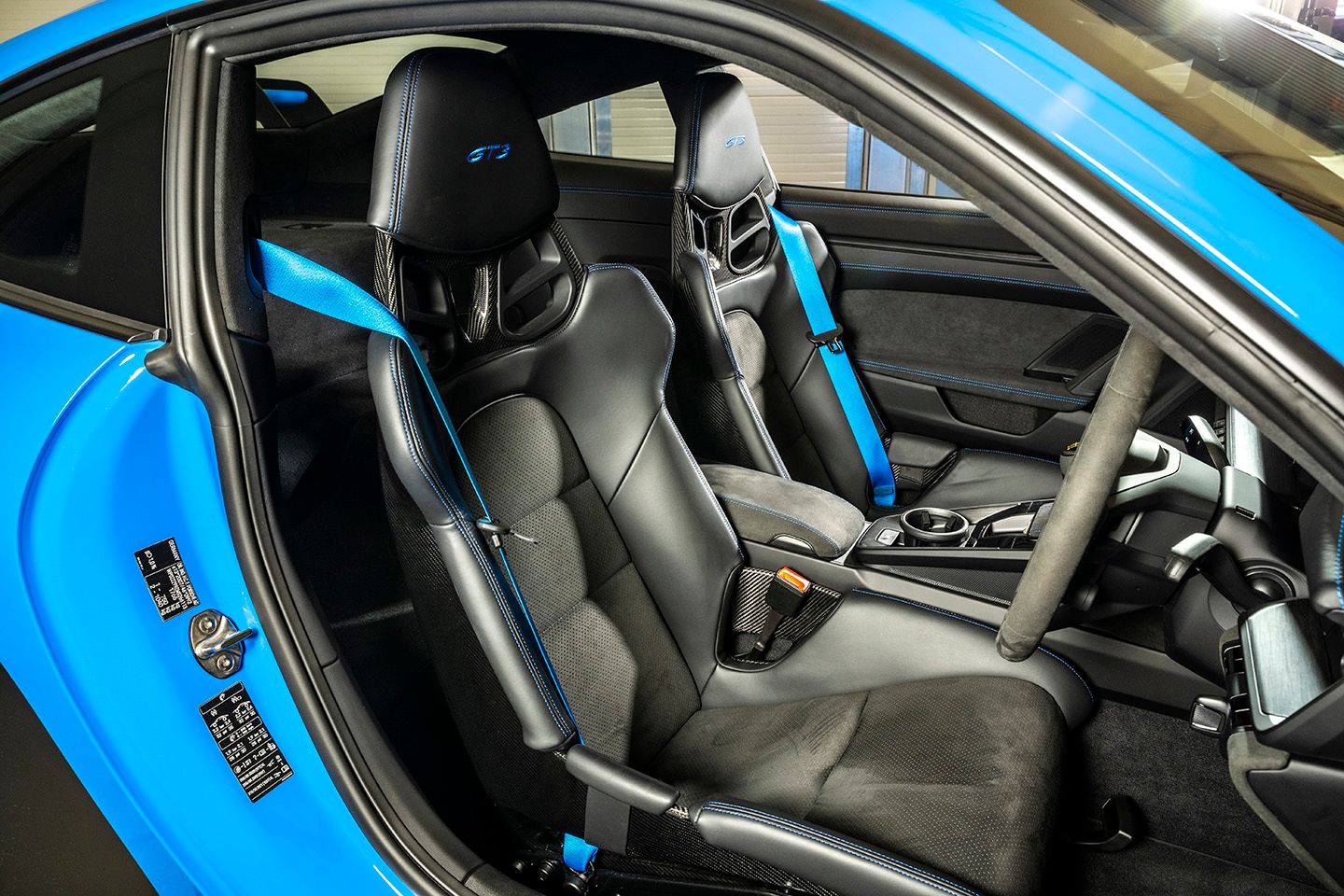
The Chrono Package option was bespoke too, putting an analogue stopwatch on the dash and a digital stopwatch in the instrument cluster which could be upgraded to provide more precise smartphone-analysable lap times through a Lap Trigger function that you could get from Porsche Tequipment.
The PCM infotainment worked well and looked great. There was only one ‘real’ cupholder in the new GT3 though, on the passenger dash side. Drivers had to try to manage their beverages in the non-circular cubby behind the gearlever. The front boot took 132 litres of cargo.
The Bose sound system was £1,000 well spent as you needed its extra power to counteract more of the road noise from those massive tyres. There was a recall for some Bose speakers, or more specifically to put right a recoding that had been brought in to limit amp power not just on the GT3 but on 992 911s generally. This had aroused some displeasure among owners who weren’t keen on the sound quality after the recoding and who believed it was only done to stop speakers being blown.
There was another recall to reprogramme the PCM/Porsche Connect system. Another recall was issued on 992s built between 2021 and 2023 to address an issue with the side airbags that might unnecessarily deploy in the event of an accident. Some GT3s from 2022 were found to have inadequate tightening on the bolts attaching the lower seat belt anchor to the seat frame, so there was a recall for that too.
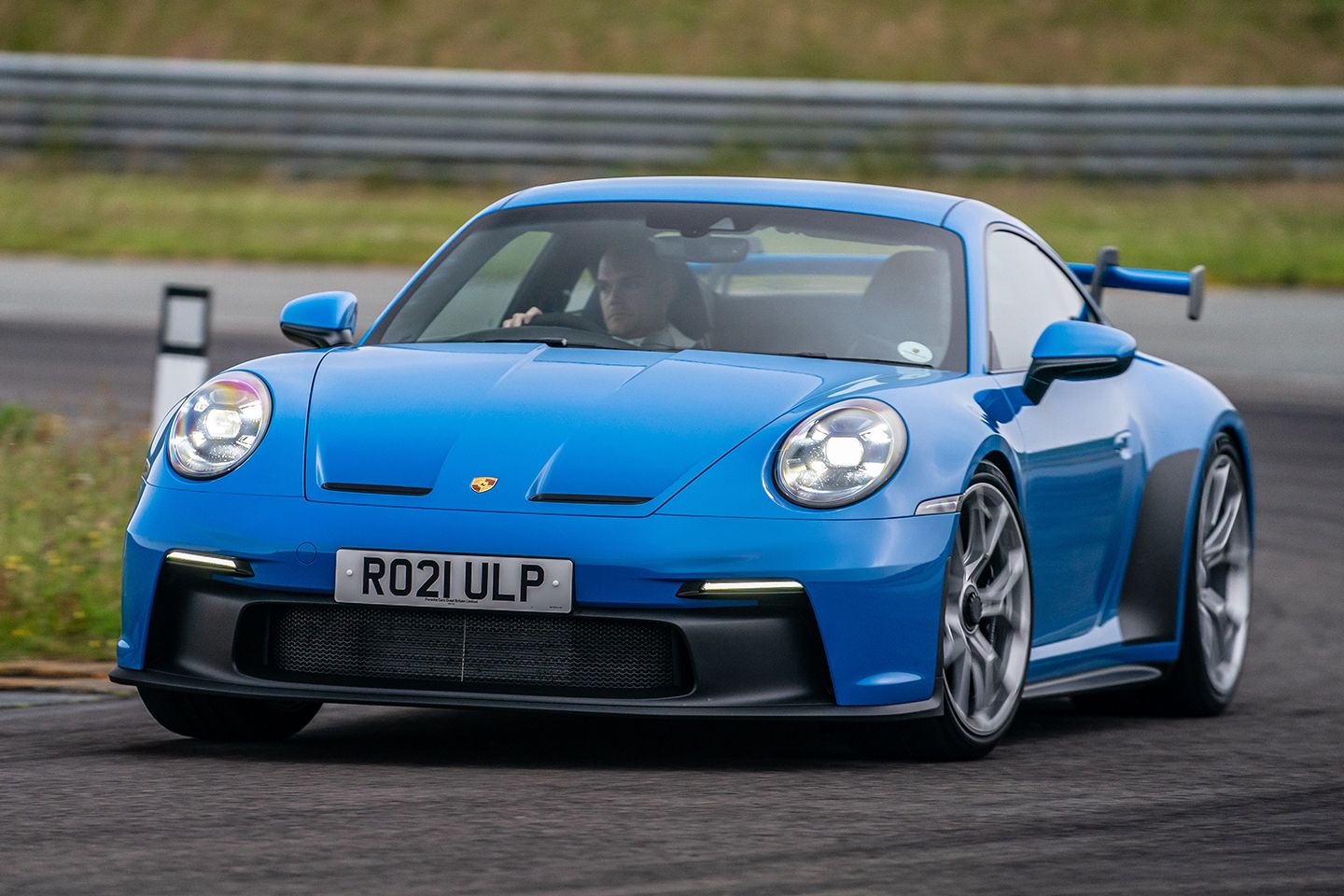
PH VERDICT
Natural or unnatural? That choice is becoming increasingly unavailable as manufacturers rely on turbochargers to deliver the sort of internal combustion performance that drivers expect while still keeping their vehicles within the confines of emissions regs, so let’s celebrate Porsche’s doggedness in continuing the GT3 line. We should also be thankful to them for delivering race-car sensations in a road car without the fear factor that you could so easily experience in a real race car.
992 GT3s have appreciated in value, but not by as much as you might have thought. That might change though when enthusiasts realise that these are going to be the last of the line. Or are they? Porsche is still developing synthetic fuels. Maybe they know something we don’t.
As noted at the beginning of this piece, the bad news is that the realistic starting price for a used 992 GT3 is £160,000. The good news is that there’s a healthy selection of cars in the £160k-£170k range. The most affordable 992 GT3 on PH Classifieds as of May 2024 was this 2021 Club Sport package manual in grey with 11,000 miles and carbon ceramic brakes at £167,995
The cheapest PDK car was this 6,000-mile 2021 example in black at £169,000. If you didn’t want the rear wing, here’s the lowest-priced Touring car, a ’22 PDK in silver with 5,000 miles at £169,900.

